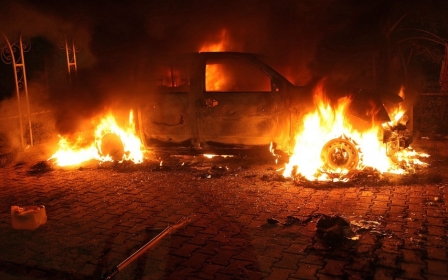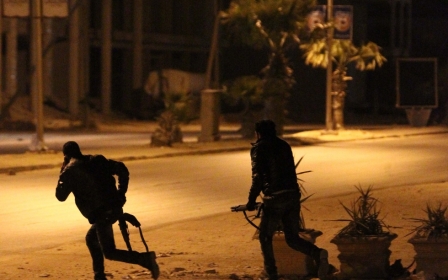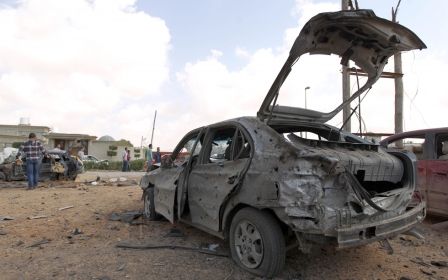"Coup" in Benghazi leaves dozens dead

Fierce clashes are continuing in Libya's eastern city of Benghazi on Friday between rival militias, killing at least 43, according to Reuters.
One of the factions fighting is led by a former Libyan rebel chief, whose forces are reportedly engaged in clashes with various militia groups based in Libya's restive eastern provinces.
According to an AFP journalist and sources on the ground, Khalifa Haftar, the former rebel leader who is spearheading the attack, launched the assault to purge the town of "terrorists".
Libyan news sites are reporting that the groups clashing with Haftar include Raf Allah al-Sahati, Ansar al-Sharia and the Martyrs of February 17 Brigade.
Benghazi airport has been closed due to security concerns, during what the government is now calling a "coup against the revolution and the state."
New MEE newsletter: Jerusalem Dispatch
Sign up to get the latest insights and analysis on Israel-Palestine, alongside Turkey Unpacked and other MEE newsletters
Witnesses interviewed by Reuters said that Haftar's assault was backed up by a government-led aerial campaign, although the Middle East Eye has not been able to independently confirm the claims. Subsequent statements from the government appear to deny its direct involvement in the assault, although the presence of military helicopters has been widely reported.
The head of Libya's national air force told the 'Free Libya' station that aircraft circling the skies of Benghazi had left their camp without authorisation.
According to the Libyan news site al-Wasat, Libya's interim Prime Minister Abdullah al-Thani urged the troops in Benghazi to exercise "self-restraint", saying they had left their barracks in al-Rajma, along with one plane and 120 armoured cars, in contravention of orders from the head of Libya's official armed forces. The prime minister also called on Benghazi's citizens to remain 'calm'.
Ghaith Shemib, who lives in Benghazi close to a checkpoint run by the powerful militia group Ansar al-Sharia, told MEE that he had seen at least three aircraft above Benghazi during the clashes. He also reported that he was still hearing gunfire in Benghazi at 19:30 (18:30 GMT) on Friday after most fighting had ceased.
After the recent upheavals in Libya, Shemib said the priority for many Libyans is the establishment of “a new army and an effective police force, who would be able to provide security.”
"Unhealthy relationship" between government and militias
The leader of Friday's attacks, Khalifa Haftar, heads a group which calls itself the "National Army", though it is separate from Libya's official state military. The group is currently engaged in a campaign they have named “Operation Dignity.”
In February 2014, rumours circulated widely that Haftar was planning a coup against the interim government after a video appeared of him saying he would launch an "initiative" under which the interim authorities would be suspended.
His call for the government to be dissolved was in response to what he described as inaction against the militia groups who have been increasingly active since Gaddafi’s 2011 ousting, particularly in Libya’s long-neglected east.
Mohamed Eljarh, a leading expert on Libya who spoke to MEE, said that for the past two years, militias have been responsible for assassinations, summary executions and, increasingly, kidnappings of wealthy citizens.
According to Eljarh, they are funded almost solely by Libya’s central government in Tripoli, which is in what he called a “very unhealthy relationship” with the armed groups.
Pressure from armed militias, he said, ensured that a law which bans any former members of Gaddafi's regime to run for public office was passed through the General National Congress this month.
In the run up to the hotly contested vote on the Political Isolation Law, armed factions who had helped end Gaddafi's rule stormed two government ministries, followed soon by the passage of the law.
This relationship between the government and militias has sparked dissent among the army and the Libyan people alike.
In March 2014, the Benghazi-based Barqa Free Channel reported that army officers based in Tobruk, near the embattled town of Derna, had issued a statement to Libya’s Chief of Staff and the Defence Ministry.
In their statement, the officers reportedly called on the government to dissolve militia groups. The officers also criticised the government for allowing Libya’s official army to fall into disrepair while continuing to fund the militias, which have increasingly been attacking the army.
In Benghazi itself, the militia groups have been growing steadily unpopular, particularly following an attack in which at least 28 civilians were killed in June 2013 when they attempted to dislodge fighters from the "Shield of Libya Forces" militia from their checkpoint.
Some observers, like Eljarh, are concerned that Haftar may be exploiting this anti-militia sentiment, as well as growing disillusionment with Tripoli’s convoluted political processes, to gain power.
However, he says, many in eastern Libya are happy to see Haftar take action against what the general calls “terrorist organisations.”
Egyptian involvement
Others, though, see a possible link to external powers in the recent unrest.
In an interview with Reuters on 15 May, Egyptian presidential hopeful Abdel Fattah al-Sisi said that post-revolution Libya was becoming a major security threat, with “jihadis” infiltrating across the border into Egypt, and requested American military aid to help Egypt deal with the problem.
His comments come after weeks of speculation in the Egyptian media about the “Free Egyptian Army”, a group purportedly based in eastern Libya and composed of thousands of fighters with loose affiliations to al-Qaeda.
The Egyptian news site el-Watan, which describes itself as the most widely read outlet in Egypt, reported on Friday that FEA fighters had carried out a “military procession” in the Libyan town of Derna close to the border with Egypt.
In early May al-Sharq al-Awsat reported that during a 29 April visit to America, Egyptian Foreign Minister Nabil Fahmy had discussed concerns about Libya’s deteriorating security situation as a priority.
Al-Masry al-Yaum cites “senior security sources” saying that the membership of the Free Egyptian Army did not number over 700, and was made up of Libyans and Egyptians, as well as other nationalities, who had gone to fight in Syria.
An expert on jihadi groups, however, has refuted absolutely these reports of an increasingly powerful Free Egyptian Army lurking on Egypt’s borders with Libya.
“There is no such thing as the Free Egyptian Army”, Noman Benotman of the London-based think-tank the Quilliam Foundation told Al Ahram.
Benotman declared instead that the numbers of Egyptians fighting in Libya could be counted “on the fingers of one hand”, and suggested a possible link between the swirling rumours of Egyptian “terrorists” and Egypt’s domestic crackdown on the Muslim Brotherhood, which it has branded a terrorist organisation.
Suggestions of an Egyptian aspect to Friday’s violence in Benghazi will highlight the fact that Haftar’s February coup attempt, subsequently branded by the Libyan media as a “non-coup coup”, reportedly had Egyptian backing.
On 19 March Haftar told the Libyan news agency Ain Libya that the Egyptian army had offered to deploy troops on the ground and to “control all the oil fields in the al-Hilal region.”
Egypt’s increasing concern for Libya, which boasts Africa’s largest oil reserves, at the time of its own energy crisis has not gone unnoticed.
On Friday Middle East Monitor quoted an American report warning that Sisi could “use the pretext of terrorism along the Egyptian-Libyan border” to launch a military campaign in Libya.
It also includes details of an article published by Debkafile, a site with close links to the Israeli intelligence services.
The article cites anxiety in the US, which sold Apache helicopters to Egypt, that the aircraft could be used to appropriate “large quantities of oil in Libya’s eastern region.”
On Saturday morning it emerged that Egypt has “agreed” to host a conference on border security, which will discuss co-operating on border security issues and solving problems in a “correct and professional” manner.”
Middle East Eye delivers independent and unrivalled coverage and analysis of the Middle East, North Africa and beyond. To learn more about republishing this content and the associated fees, please fill out this form. More about MEE can be found here.




